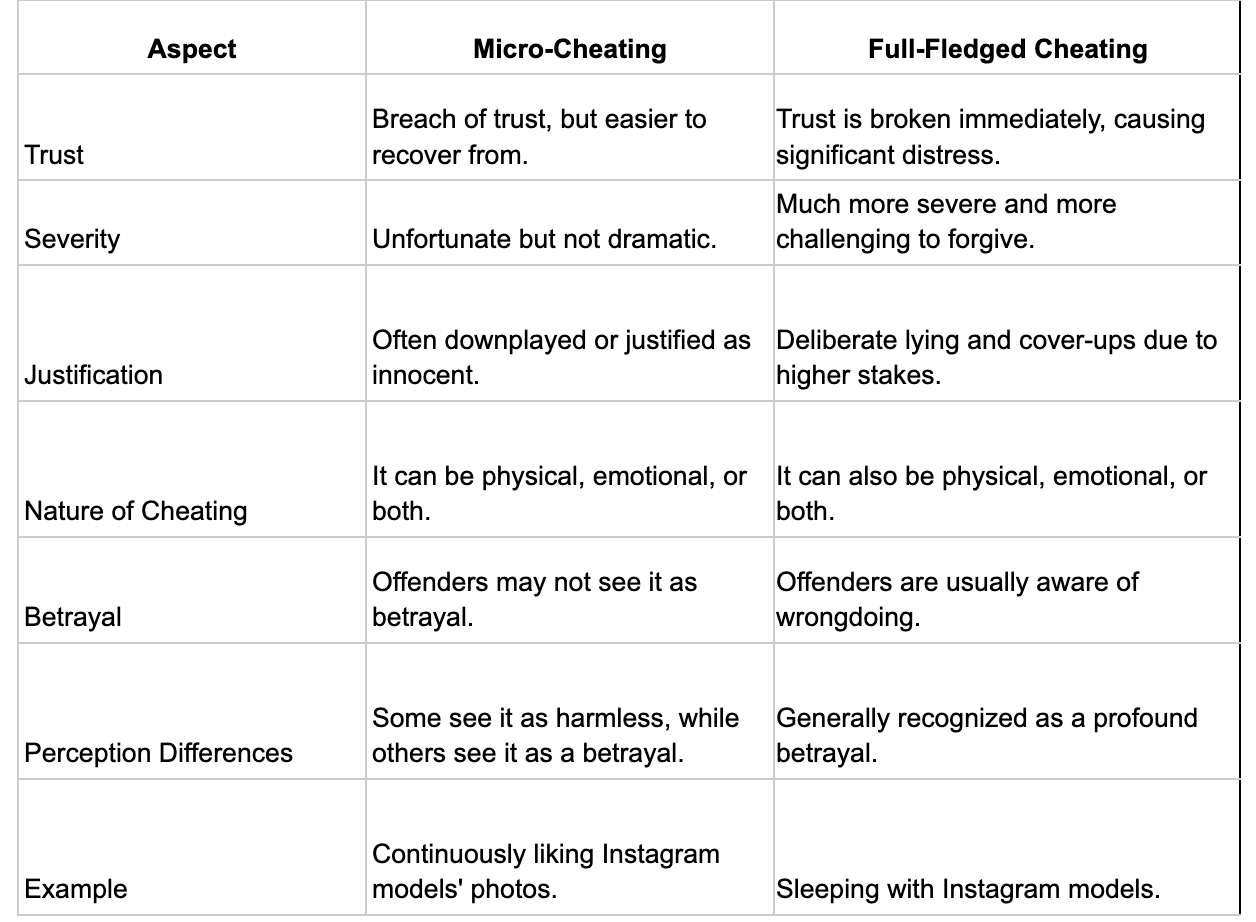It’s nice to hear if they tell you they don't cheat in a relationship. But don’t fully relax just yet! They can be micro-cheating, which is technically not the same as full-fledge cheating but still isn’t nice.

What is micro-cheating
Micro-cheating is sneaky and sly behavior in which something a person does can’t be qualified as cheating, but it definitely would upset their partner. It usually involves some level of secrecy and flirtation or emotional connection on the side.
Micro-cheating examples
What qualifies as micro-cheating depends mainly on individual perception of fidelity. For example, if your boyfriend is still texting his ex and claims they’re just friends now, some might see it as weird and a betrayal, while others don’t care about those things.
Here are the micro-cheating behaviors that the majority would find fishy.
If you notice that you or your partner is guilty of some of the behaviors listed above, it makes sense to have an honest talk to try and get to the root cause.
Also, it’s a good time to reconsider your relationship and see if it’s your priority. People often engage in micro-cheating when they slowly start to drift away from their partners. Usually, they don’t even realize what they’re doing is wrong. Still, they’re simply unhappy or uninterested in their current romance, and flirting or talking with someone else becomes a refuge and a sweet escape from the routine.
- Flirting with someone who is not your partner
- Remaining a close friend with your previous lovers
- Following and engaging with suggestive social media accounts
- Hiding your communication with people
- Pretending you don’t like someone when, in fact, you do
- Establishing emotional intimacy with somebody else, for example, a coworker
- Talking about your relationship with someone else
- Texting and calling someone saved in your phone under a fake name
- Kissing, hugging, holding hands, or otherwise touching different people
- Thinking of others when you masturbate
- Talking about other people or exes regularly
If you notice that you or your partner is guilty of some of the behaviors listed above, it makes sense to have an honest talk to try and get to the root cause.
Also, it’s a good time to reconsider your relationship and see if it’s your priority. People often engage in micro-cheating when they slowly start to drift away from their partners. Usually, they don’t even realize what they’re doing is wrong. Still, they’re simply unhappy or uninterested in their current romance, and flirting or talking with someone else becomes a refuge and a sweet escape from the routine.
Micro-cheating vs emotional cheating

The two terms are often confused because they are similar. Both can be considered soft cheating, but they describe very different behaviors.
Emotional cheating is one of the elements of micro-cheating. It is all about creating a platonic intimate relationship with someone outside your relationship. For example, when your partner starts sharing their deepest secrets, big dreams, and worries with their friend or coworker, they continue to do that for an extended period, resulting in a strong bond between them. Another example is if you fight, and your lover vents to someone else about it.
Micro-cheating includes emotional cheating, but it can also be many other things. For example, micro-flirting, kissing others, hugging, or holding hands are all examples of micro-cheating that do not lead to creating an emotional connection but are very hurtful nonetheless.
Emotional cheating is one of the elements of micro-cheating. It is all about creating a platonic intimate relationship with someone outside your relationship. For example, when your partner starts sharing their deepest secrets, big dreams, and worries with their friend or coworker, they continue to do that for an extended period, resulting in a strong bond between them. Another example is if you fight, and your lover vents to someone else about it.
Micro-cheating includes emotional cheating, but it can also be many other things. For example, micro-flirting, kissing others, hugging, or holding hands are all examples of micro-cheating that do not lead to creating an emotional connection but are very hurtful nonetheless.
Read more about emotional cheating in our article.
6 signs of micro-cheating
What if you suspect your partner is doing it but can’t put a finger on it? There are micro-cheating signs that can point it out to you:
If you’re unsure whether someone is micro-cheating, you can watch their reactions when confronting them. If you ask them about a specific behavior or a particular person, and the partner gets annoyed, defensive, aggressive, ridicules you, or downplays the act, then they probably are micro-cheating. If someone is shady, they will have one of those reactions.
- Flirtatious behavior, such as suggestive body language, extended eye contact, or playful conversations
- Giving someone compliments many times over
- Giving someone special attention regularly
- Stalking others online and engaging with their content
- Trying to touch others in situations where it’s not appropriate
- Keeping dating profiles active while being in a relationship
If you’re unsure whether someone is micro-cheating, you can watch their reactions when confronting them. If you ask them about a specific behavior or a particular person, and the partner gets annoyed, defensive, aggressive, ridicules you, or downplays the act, then they probably are micro-cheating. If someone is shady, they will have one of those reactions.
Difference Between micro-cheating and full-fledged cheating
What if you suspect your partner is doing it but can’t put a finger on it? There are micro-cheating signs that can point it out to you:

With full-fledged cheating, trust is broken immediately, causing significant distress to the person cheated on. Micro-cheating, on the other hand, is unfortunate but not as dramatic, and it’s easier to recover from. For example, if someone continuously likes the photos of Instagram models, you can address it and move on. Yet, if this person is sleeping with these Instagram models, a breakup is much more inevitable, and forgiving those actions is much harder.
In terms of how cheating is handled by the offender when it’s micro-cheating, they can downplay or justify their actions, saying that they didn’t mean it like that or hid something from you because they thought you wouldn’t believe them that it’s innocent.
When someone is hardcore cheating, on the other hand, they usually lie and cover up deliberately, as the stakes are much higher.
In terms of feelings, both full-fledged cheating and the micro version of it can be purely physical or emotional, or both. However, with micro-cheating, the cheater can be unaware of their betrayal or not see it as one. The example of an ex-lover friend demonstrates this very well. Some people are cool with staying friends with their ex-lovers and don’t care for them romantically anymore, but for someone else, doing it means that there is still something between them.
In terms of how cheating is handled by the offender when it’s micro-cheating, they can downplay or justify their actions, saying that they didn’t mean it like that or hid something from you because they thought you wouldn’t believe them that it’s innocent.
When someone is hardcore cheating, on the other hand, they usually lie and cover up deliberately, as the stakes are much higher.
In terms of feelings, both full-fledged cheating and the micro version of it can be purely physical or emotional, or both. However, with micro-cheating, the cheater can be unaware of their betrayal or not see it as one. The example of an ex-lover friend demonstrates this very well. Some people are cool with staying friends with their ex-lovers and don’t care for them romantically anymore, but for someone else, doing it means that there is still something between them.
How does micro-cheating affect relationships?
Something is off in a relationship if you’re engaging in micro-cheating. Sometimes, this indicates that people aren’t meant for each other, or it’s the first stage of the cheating progression that will happen in the future.
In any case, if someone is micro-cheating, they’re not fully involved with their primary partner and are not as good of a lover as they used to be. For the other person, knowing that their lover is having an affair is hurtful and makes them doubt the relationship.
If micro-cheating is not a one-off thing but a continuous pattern, it will slowly but surely rot the relationship inside out.
In any case, if someone is micro-cheating, they’re not fully involved with their primary partner and are not as good of a lover as they used to be. For the other person, knowing that their lover is having an affair is hurtful and makes them doubt the relationship.
If micro-cheating is not a one-off thing but a continuous pattern, it will slowly but surely rot the relationship inside out.
What should I do if my partner is micro-cheating?

If you spot signs of emotional affairs and other micro-cheating tricks, there are several ways you can address and handle this situation.
Avoid reacting emotionally
It’s annoying when something terrible happens, and you’re told to calm down, but that’s the best approach. First, you need to confirm that this is, in fact, micro-cheating, and then you can react. But if you want to keep this relationship, it might be best to deal with it calmly.
Discuss the issue
Communication is the key and the best way to resolve any romantic issues. Ask your partner directly, but in a non-accusatory tone, about their actions and take it from there.
If they try to gaslight you, call you crazy, or minimize their actions, point out that this is micro-cheating in your books, and nothing they’re saying can change that.
Define the boundaries
If you want to stay in this relationship, you must define new boundaries. Tell your partner what is allowed and what is not, and specify the consequences of disrespecting those boundaries.
Work on strengthening your bond
micro-cheating is often a symptom of a more significant relationship issue, so you should take the time to work out whatever is going on between you two. If it is simply caused by you drifting apart, spend more quality time together, talk, experience different things as a couple, plan for the future, and do other work to reestablish and strengthen your bond.
Seek support
Dealing with relationship issues can be difficult, especially if you’ve never experienced them before. Sometimes, it’s best to reach out to a professional who can guide you and curate the discussion to help keep it productive and non-accusatory.
Flure isn’t just a dating app—it’s your gateway to meaningful connections and unforgettable experiences. Whether you’re seeking new friendships, someone special, or just exploring, Flure makes it easy to find your kind of people. Built on trust, safety, and authenticity, Flure turns your online dating into something truly magical. Ready to make connections that matter? Join Flure today and see where it takes you!
FAQ
Are there gender differences in perceptions of micro-cheating?
Nowadays, the norms for gender behaviors are shifting more towards equality, but still, many things men do are perceived to be okay, while women are disproportionately criticized for them.
What is an emotional affair?
It’s sharing the most intimate dreams and worries, discussing their romantic relationships, and replacing their actual partners with this other person regarding emotional support and connection.
What’s the difference between cheating and an affair?
Cheating can be a one-off and primarily describes physical intimacy. At the same time, an affair is something that’s going on for a more extended period and involves emotional connection and even love.
Cheating is just physical?
It can be both physical and emotional.
Is thinking about someone else cheating?
It depends, but usually, yes, it is cheating. If you continuously think about someone and imagine what it would be like being with them, then it’s the first step of cheating.








